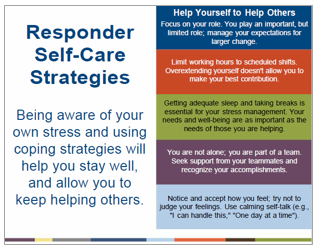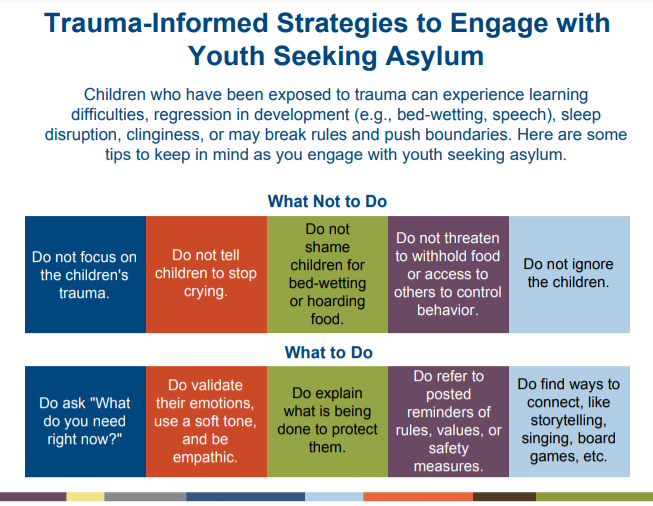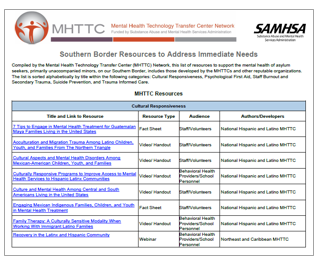Home > Resources to Support the Mental Health of Refugees and Asylum Seekers

Providing care and support for children, youth, and families as they navigate the asylum system can be challenging. It can be hard to know how to be as helpful as possible, especially when communication is difficult. Below are some key concepts that may assist in engaging with asylum seekers.
1. Simple actions are impactful. Asylum-seeking youth may cope effectively by distrusting others and remaining wary of relationships. Simple actions that could support youth include always introducing yourself and stating your role, keeping interactions routine and predictable, never making promises (such as safety), and connecting through positive interactions.
2. Focus on your role and manage expectations. Supporting asylum-seeking children is crisis work. The focus is to provide short-term safety and security, both physical and emotional. It can be frustrating to not know what happens to the children after they leave the facility. Recognize that you play an important, but limited role, and manage your expectations for larger change.
3. Set clear guidelines for interactions. Asylum-seeking children have had traumatic experiences before immigration, during immigration, and will likely experience trauma in the coming months. The stress of uncertainty is a part of the asylum process. Avoid asking about immigration or trauma experiences if you can. Establish a positive, short-term relationship.
4. Support culturally-responsive care. Hold your assumptions about the culture of asylum-seekers lightly. It is not possible to know the culture, values, religions, languages, and political or economic realities of all children and youth. While some children may find comfort in things that remind them of home, others may be distressed by those reminders. Each child is unique.
5. Reflect on the strengths of youth. The young people in your care are more than asylum seekers or children who have suffered. They have their own unique strengths and coping skills. If you find yourself feeling frustrated or distressed in the work, stop to intentionally name the strengths and positive qualities of the children and youth you are supporting.
The following is a list of resources compiled by the MHTTC Network to support the mental health of asylum seekers, primarily unaccompanied minors, on our Southern Border. The list includes resources developed by the MHTTCs and other reputable organizations.


Responder Self-Care Strategies
Being aware of your own stress and using coping strategies will help you stay well, and allow you to keep helping others. This pocket card offers some tips for volunteers and behavioral health professionals to keep in mind as they respond to emergency situations.

Trauma-Informed Strategies to Engage with Youth Seeking Asylum
Children who have been exposed to trauma can experience learning difficulties, regression in development (e.g., bed-wetting, speech), sleep disruption, clinginess, or may break rules and push boundaries. This pocket card offers some tips to keep in mind as volunteers and behavioral health professionals engage with youth seeking asylum.

Southern Border Resources to Address Immediate Needs
Compiled by the MHTTC Network, this list of resources to support the mental health of asylum seekers, primarily unaccompanied minors, on our Southern Border, includes those developed by the MHTTCs and other reputable organizations. The list is sorted alphabetically by title within the following categories: Cultural Responsiveness, Psychological First Aid, Staff Burnout and Secondary Trauma, Suicide Prevention, and Trauma Informed Care.

TTC Resources to Support Asylum Seekers at the US Southern Border
TTC Resources for Community Engagement
Addressing Mental Health Needs of Hispanic and Latino Unaccompanied Minors Web Panel | National Hispanic & Latino MHTTC
Broken Borders: Responding to Trauma in Hispanic and Latino Immigrants and Refugees | South Southwest MHTTC
Culturally Sensitive Psychoeducational Services for Hispanic Unaccompanied Children Web Panel | National Hispanic & Latino MHTTC
Engaging Ecuadorian, Peruvian, and Nicaraguan indigenous Populations in Mental Health Treatment | National Hispanic & Latino MHTTC
Engaging Mexican Indigenous Families, Children, and Youth in Mental Health Treatment | National Hispanic & Latino MHTTC
Mental Health Assessments for Unaccompanied Minors in the United States | National Hispanic & Latino MHTTC
Northern Triangle Unaccompanied Children and Families Seeking Asylum: Impact of Traumatic Events on Children’s Attachment and Reunification Processes | National Hispanic & Latino MHTTC
On-Demand: Addressing Immigrant Culture, Language, Diversity and Inclusion | Southeast MHTTC
Strategies to Increase Community Participation of Unaccompanied Minors | National Hispanic & Latino MHTTC
Suicide Attempts and Culturally Responsive Approaches for Latinos | National Hispanic & Latino MHTTC
Supporting Refugee Families' Mental Health through Prevention & Community Partnerships | New England MHTTC
Supporting the Mental Health of Refugee and Asylee Communities | MHTTC Network
The Faces of Immigration: Humanizing Children and Creating Culturally Congruent School-Based Contexts | National Hispanic & Latino MHTTC
Tips to Engage in Mental Health Treatment: The Indigenous Populations from the Northern Triangle | National Hispanic & Latino MHTTC
Tips When Working with Unaccompanied Minors from Guatemala, Honduras, and El Salvador | National Hispanic & Latino MHTTC
Trauma Informed Work with Asylum-Seeking Youth at the Border | South Southwest MHTTC
Unaccompanied Children and Families Seeking Asylum: Traumatic Effects on Children’s Attachment and Reunification | National Hispanic & Latino MHTTC
7 Tips to Engage in Mental Health Treatment for Guatemalan Maya Families Living in the United States | National Hispanic & Latino MHTTC
Organizations
National Child Traumatic Stress Network (NCTSN)
National Network to Eliminate Disparities in Behavioral Health (NNED)
Substance Abuse and Mental Health Services Administration (SAMHSA)
Websites
Collective for Refugee and Immigrant Womens' Wellbeing
Integrated Refugee and Immigrant Services (IRIS)
Latinx Immigrant Health Alliance
Lutheran Community Services Northwest
Muslim Mental Health and Islamic Psychology Lab
Sacramento Cultural and Linguistic Center
Manuals/Guides
Behavioral Health Implementation Guide For The National Standards for Culturally and Linguistically Appropriate Services in Health and Health Care | US Department of Health and Human Services, Office of Minority Health
Walking Together: A Mental Health Therapist's Guide to Working with Refugees | Lutheran Community Services Nothwest
Tip Sheets
Mental Health Facts on Refugees, Asylum-Seekers, & Survivors of Forced Displacement | American Psychiatric Association
Resources from the Office of Refugee Resettlement (ORR) | ORR
Supporting Refugee Children & Youth: Tips for Educators | NASP
Articles/Reports
COVID-19 Culturally Informed Crisis Management for Displaced or Refugee Populations
SAMHSA’s Disaster Distress Helpline is standing by 24/7 to support you during the pandemic & beyond. Toll-free, multilingual, & confidential support services are available to all residents in the U.S. & its territories. Call 1-800-985-5990 or text TalkWithUs to 66746 to connect with a trained counselor.